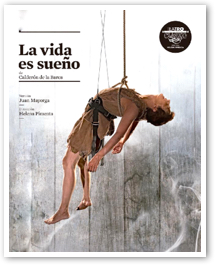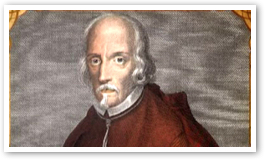The Church, Mater Dramatis: How the Church has changed the world
- ANTHONY ESOLEN
"Señor Carpenter," calls a man wearing the cord of a lay Franciscan, "have you heard what I want you to make?"
Join the worldwide Magnificat family by subscribing now: Your prayer life will never be the same!

"Yes, Señor, but only in a general sense. You want me to construct a kind of cage."
"A cage, yes," says the Franciscan, considering. "But this has to be a kind of prison that seems to be a world in itself."
"It is not an ordinary prison cell, then," says the carpenter.
"No, not at all. The audience must see the cell, but only hear the voice of the prisoner, Sigismundo. Here's the idea. Sigismundo's father, King Basilio, had heard a prophecy that his son would grow up to be a brute, and to conquer his father in battle. So he has had him brought up all his life long in a prison, to keep the prophecy from coming true. Yet Sigismundo has a man's heart. He sees the stars through a small window opening out to the night sky. He hears the song of birds he has never seen. He has been given an education in the humane letters. He has seen only one human face, that of his jailer, who will come and visit him in a few of the opening scenes. Yet he has a soul that longs for the infinite. You must build me that cell."
The carpenter thinks it over. "I've seen a cave by the seashore, Señor," he says, "that was so dark and deep, it seemed it could be an entrance to hell, while heaven stretched above it. Hell, Señor, and heaven, and earth the narrowest strip of land between them. I can make something like that, Señor. I will fashion a door for the scene with the jailer, but the voice of your Sigismundo will come up from the earth of the cave, through a small high opening tilted like this," fixing his hand at a slant, "to show your audience that he looks at the sky."
"Excellent! I believe that will do fine."
The carpenter hesitated a moment. "Señor Calderón?"
"Yes?"
"Will the prophecy be fulfilled?"
"Why, how can it be a prophecy," says Calderón with a wink, "unless it is fulfilled?"
Leaders of culture
The author is Pedro Calderón de la Barca (1600-1681), the greatest dramatist in the Golden Age of Spanish literature. The play is La Vida es Sueño, Life Is a Dream, first performed when he was still a young man. Like all of Calderón's more than two hundred plays, it is part drama, part empassioned lyric poetry, part philosophical and theological examination of a few of the great existential themes concerning human life: destiny, free will, reason, ambition, vengeance, and love. King Basilio is having second thoughts about what he has done to his son. He is going to set Sigismundo free to see what will happen. If Sigismundo is the brute he has been foretold to be, then they will clap him in his cell again and tell him that his brief day of freedom was only a dream, an illusion.
Will Sigismundo's reason triumph over his rage against the wrongs that have been done to him? When he sees a woman for the first time in his life, will he be able to put reins on his desire? Can he forgive his jailer? Can he forgive his father? What does it mean, that "life is a dream"? Is all our pursuit of glory only vanity, as the Preacher says? Is it swift and vanishing, like a dream? Is it filled with illusions and errors? Or is this life a shadowy prelude of the true life to come? Is it the prologue to the true play? Is it a vision?
 Pedro Calderon de la Barca
Pedro Calderon de la Barca1600-1681
Well, you will have to read Life Is a Dream to find out. But I'd like to stress something that is not coincidental. Calderón was a devout Catholic, who later in life became Padre Calderón, a priest, and the chaplain at the royal court in Madrid. He continued to write plays after he took Holy Orders. Most of those were autos sacramentales, or sacramental acts, highly allegorical meditations upon Christ or the sacraments or the last things, seeing all of human history, even the dreams of paganism, in the light of Christ.
One of these, for example, is called El Verdadero Dios Pan, The True God Pan. We've all seen sculptures of the horned and goat-footed Greek god, playing the "Pan" pipes, or flirting with a nymph. Pan was the god of shepherds, and his name, in Greek, can also mean "everything." That set Christian theologians and poets to thinking. Christ is the true God of Shepherds, and Christ is the one through whom all things are made. We who follow him, says Saint Paul, must in our lives seek to reestablish all things in Christ; not just the Sunday dressing, but all things: family life, political life, education, art, music, work and play, everything.
There's more. Pan, in Spanish, means bread: so the Word that became carne, flesh, the Word through whom pan, all things, are made, becomes pan, bread, so that the Good Shepherd not only gives us the good pasture, but is himself that pasture, in the Blessed Sacrament.
You will say, "There's no surprise, here. A priest writes devotional literature. We understand."
Not so fast. The greatest lyric poet in the Golden Age was Juan de la Cruz — the mystic Saint John of the Cross, a priest. The greatest psychologist of the inner life was his friend the cloistered nun, Saint Teresa of Ávila. Calderón's greatest predecessor in drama was the mischievous Lope de Vega, also a priest. The titan of Spanish literature, writing during this same era, was Cervantes, the former soldier whose greatest boast was that he had fought for the Christian faith at Lepanto.
Great literature has its roots in religion, and the Christian faith is essentially dramatic.
The drama of freedom
If we are only dust, or brutes, if we have no free choice, if the world has no meaning, then life is merely absurd, and drama is impossible. The Christian message is that we are dust destined for glory or misery; that we are made in the image of the utterly free God; that God is present and at work fully in every millimeter of space and every moment of time; that time is the moving shadow of eternity.
Think of the drama in the Gospels! Peter hauls in the load of fish over the side of his boat, having set out again on the water, and not too happy about it either, at the insistence of a stranger, a carpenter. "Lord," he says to Jesus, "depart from me; I am a wicked man." And if Peter had insisted, what then?
"Sell all you have, give it to the poor, and come, follow me," says Jesus to the rich young man, whom he looked upon with love. And the youth walked away, because his possessions possessed him. The camel could not squeeze through the needle's eye. And if he had stayed, what then?
"Saul, Saul," cries the Lord to the Pharisee flat on the ground, "why do you persecute me?" And if Saul had justified himself, what then? "Do you have no fear of God or man?" says one of the thieves crucified upon Calvary. "We committed the crimes for which we are punished, but this man was innocent." And if his fellow thief had turned to Jesus? "Zacchaeus," says Jesus to the diminutive tax collector, "I am having supper at your house tonight!" And if the fellow had never climbed the tree?
We are compassed roundabout with so great a play of mysteries!
The only drama there is
Maybe we can go farther still and say that all drama is a version of the drama, the one that begins with creation and ends in judgment, whose King and center is the heart of Jesus Christ.
We're in a desert of the American West. A wagon train has been attacked by Indians. Everyone is dead except for a single woman and her newborn baby. She is dying. Along come three bank robbers, rascals rather than devils, fleeing from the law. They come to the stagecoach and see her there with the child. She makes them swear to her that they will take the child to safety. Where will they get water for the baby? What about food? Where can they go, when the marshal is hunting them down? But they do swear.
It's the film Three Godfathers, by John Ford, the cantankerous Catholic director. It might as well have been a sacramental play by Calderon. We think that the men are saving the baby, but the baby is saving the men. They are the ones being redeemed from slavery to their sinful ways, and two of the three will give their lives in the quest to save the child. They are errant Christians; the third, played by John Wayne, is wholly unchurched, but he will eventually allow himself to be taken by that marshal for the sake of the child, and at his trial the marshal himself will testify to his character. When the film ends, we know that Wayne will serve his time in prison, and then will come back to a truly human life, lived in the light of the cross.
Hollywood, as seedy as it was, could in those days still produce dramas of sacramental reality, dramas in which sinful man is saved by the True God Pan, he who was the Good Shepherd, who is the bread from heaven, and who laid down his life for the sheep. It's been a long time since the days of Ford. I might say that Hollywood will rise from its place worse than death only if we all remember that in the end there is only one drama — is, was, and ever will be. Then maybe another Franciscan brother, or another priest of God, will ascend the director's chair and call out, "Action!"
 This is Meaghen Gonzalez, Editor of CERC. I hope you appreciated this piece. We curate these articles especially for believers like you.
This is Meaghen Gonzalez, Editor of CERC. I hope you appreciated this piece. We curate these articles especially for believers like you.
Please show your appreciation by making a $3 donation. CERC is entirely reader supported.

Acknowledgement
 Anthony Esolen. "How the Church has changed the world." Magnificat (November, 2014): 200-205.
Anthony Esolen. "How the Church has changed the world." Magnificat (November, 2014): 200-205.
Join the worldwide Magnificat family by subscribing now: Your prayer life will never be the same!
To read Professor Esolen's work each month in Magnificat, along with daily Mass texts, other fine essays, art commentaries, meditations, and daily prayers inspired by the Liturgy of the Hours, visit www.magnificat.com to subscribe or to request a complimentary copy.
The Author

Anthony Esolen is writer-in-residence at Magdalen College of the Liberal Arts and serves on the Catholic Resource Education Center's advisory board. His newest book is "No Apologies: Why Civilization Depends on the Strength of Men." You can read his new Substack magazine at Word and Song, which in addition to free content will have podcasts and poetry readings for subscribers.
Copyright © 2015 Magnificat

